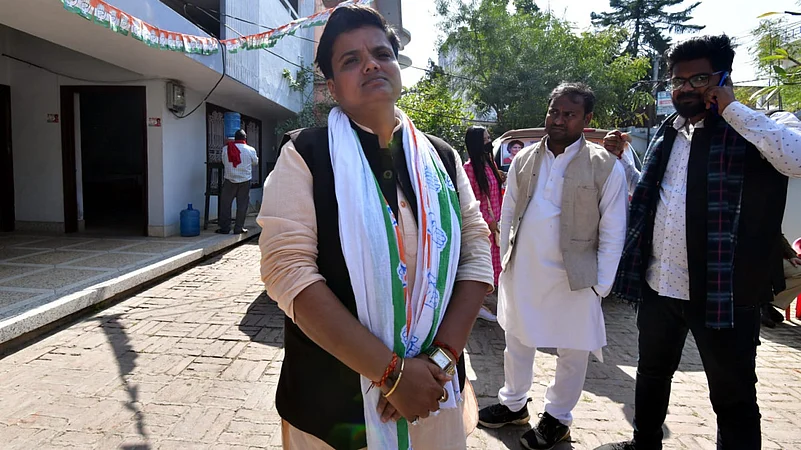She comes to politics with poetry and music in her arsenal. For the people of Gorakhpur City, Congress candidate Chetna Pandey, Yogi Adityanath’s challenger on his home turf, has been something of a star — a soprano singing of their plight and pain at kavi sammelans and mushairas (poetic soirees), and a tabla virtuoso winning accolades with her taals at national and international-level cultural programmes.
Diminutive and short-haired, Pandey has a quiet and humble demeanour, but when she speaks, she sounds supremely assured. An erstwhile member of Akhil Bharatiya Vidyarthi Parishad (ABPV) and a former vice-president of Deen Dayal Upadhyaya Gorakhpur University Students’ Union, she has been working for the party for over three years, reaching out to the poor in the 11 zones of the district, where nine Assembly seats will be up for grabs. At the Gorakhpur Sadar seat, Brahmin voters are substantial and she was given the ticket taking into account the caste matrix. Voting here would be held in the sixth phase on March 3.
Pandey, who is believed to have been handpicked by Priyanka Gandhi Vadra, Congress general secretary and in-charge of Uttar Pradesh, to give impetus to the party’s ‘Ladki Hoon Lad Sakti Hoon’ campaign, says her resolve is to bring in constructive politics that rises above the narrow parameters of caste, creed, and religion. “In UP’s politics, caste always plays a role. This time is no different. However, it is my hope that a day comes when the most deserving candidate is given the ticket and the voters elect that leader purely on the basis of his/her credentials and not because of any other extraneous reason.” She sees the change on the horizon as the people of Gorakhpur have “suffered enough,”, especially during the last five years of Yogi’s reign. “Gorakhpur’s people are prabuddh (intelligent) and they know better,” she says.
Since Yogi has represented the district as an MP from 1998 till he was made the CM in 2017, Pandey argues that it’s he who should be blamed for the various problems the city is facing, including bad roads and poor drainage system. Commenting on the CM’s “dirty little barbs” at the Opposition, she says, “He is a Mahanta, a saint, who is considered to be pious. But if he is resorting to mean talk and pettiness, there must be some fault in his sainthood.”
The BJP, she holds, is raking up unnecessary issues in order to divert people’s attention from the real ones. The party’s attempt to polarize is sad but not surprising. “Logon ke bhawnaon ko bhadka kar ek samriddha samaj ki kalpana nahi kar sakte (You can’t create a welfare society by whipping up people’s emotions),” says Pandey, who feels that imposing a particular ideology on any community is ‘morally and ethically' wrong. On the Centre’s attempts to discredit Rahul Gandhi, Pandey says that the mark of a true leader is not just limited to being a good orator: “Not every leader can be a good speaker. The real issue is whether your facts are right or wrong. Today, the Centre is spending crores of rupees to weaken Rahul Gandhi and to prove him an idiot. But it is they themselves who turn out to be the real idiots as it happened in the case of the second wave. If you are a true leader, you don’t engage in tall talk with absolute disregard for facts. People expect you to work. You are not an actor who should focus on dialogue delivery.”
Responding to the Yogi government’s claim that it has freed Gorakhpur of ‘goondas,’ Pandey cites the recent killing of a businessman by the police. “The truth is that anyone who speaks the truth here gets killed. That’s their law and order.” To Pandey, Congress is fighting ‘astitva ki ladayi’ (the battle for existence) on behalf of the women and the marginalised. This fight is bound to bring in a change, which will ensure “roti, kapda aur makaan/swastha, suraksha aur samman” for everyone.
Pandey, 37, completed her primary education in Majhgawan, a village in Bansgaon tehsil 42 km from Gorakhpur, where she was born. After completing her PhD in Hindi from Gorakhpur University, she ventured into activism, dedicating herself to the poor, soon after she was elected the students’ leader by a huge margin. She also worked as a journalist for a brief period. Simultaneously, she kept participating in several national-level kavi sammelans and cultural events, where she has been a fixture since she was eight. Before she joined the Congress in 2019, she fought the 2017 Assembly elections as an Independent candidate in the 2017 Assembly elections. However, she managed to get only 2200 votes. This time around, however, she is hoping for a better result.
Since her student days, Pandey has been highlighting people’s issues and problems through her poetry. “I have to raise these issues even in politics: poetry and politics, after all, are interlinked.” In one of her popular quatrains, she reflects on the social stasis in the life of a nation even after a political change — only the colour of the flag changes while everything else remains the same: Zindgani mein kuch naya kya hai/Is kahani mein kuch naya kya hai/Zirf jhande ka rang badla hai/Rajdhani mein kuch naya kya hai. She has published two collections of poetry: "Chetna Ke Geet" and “Geet Aur Msutak”, which have been received well. She has also performed for All India Radio and Doordarshan. For her poetry and tabla recitals, she has been awarded a gold medal.
As a poet of democracy, Pandey’s preoccupation is the common people — the dearth in their lives, the death of their dreams, their hunger, their thirst. While the BJP’s campaign makes much of development in Gorakhpur, Pandey underlines that it has been selective and has not benefited the needy: Jahan par pyaas hai dariya nahin hai/Zaroorat hai kahin, suvidha kahin hai/ Badhe hai roz aarakshan ka pratishat/Dalit basti jahan par thi, wahin hai. (Where there is thirst, there is no river/Where there is need, there is no facility/ Reservation’s percentage keeps rising/Dalit settlement, still where it used to be). Hers is a brutally honest voice, not afraid to look at the stark social and political realities in the eye. As the BJP leaders, including Prime Minister Narendra Modi, resort to their time-tested formula of polarisation, Pandey declares: “Mansooba yahi tha chalo aasan ho gaya/phir mudda wahi Hindu-Musalman ho gaya. (This was precisely the agenda, it’s easier now/the issue, once again, is Hindu-Muslim).

In one of her poems, Pandey writes about ‘badi ka samparpan’ (surrender of the evil). In the same poem, a line reads: “Kabhi jab samay tum ko sagar bana de/nahin bhool jana nadi ka samarpan (If ever time transforms you into an ocean/never forget the river’s surrender).” Time, change, power, thirst and ocean are some recurring metaphors in her poetry that capture the social inequality: “Gazab ke khel dikhlaye qalandar/samay ki chaal se haara Sikandar/Kisi ke haath mein bas pyaas aayi/kisi ne pee liya saara samandar (The fakir pulls off such wondrous tricks/Time’s scheme made Sikandar lose/In someone’s share there was only thirst/While someone drank up the entire sea).” This theme of the conflict between want and privilege finds expression in another quatrain: “Woh bure daur ki aahat khareed leta hai/kisi bhi dard se raahat khareed leta hai/log marte hain yahan ek ghoont paani ko/woh to ek lamhe mein panghat khareed leta hai (He buys the inkling of the bad times/Buys relief by exchanging any pain/People die for a drop of water/In an instant, he buys the waterbank).”
Pandey’s realm has been of feeling, emotion, imagination as well as of riyaaz and saadhna. But politics and revolution never remain too far from her gaze. In ‘The Politics of Poetry’, David Orr, a professor of Politics in the US, writes that poetry and politics connect through expression and feeling as both of them are matters of persuasion. Pandey frequently flits between the two persuasions. She is not the one to walk on easy paths, not one who can be silenced: Sugam panth par jaaon to durgam panth chunega kaun?/Main bhi chup ho jaaon to kranti naad phoonkega kaun? (If I walk the easy path, who will chose the one with difficulties?/If even I get silenced, who will sound the bugle of revolution?”). In the same poem, she seems adamant to draw attention to the issues that matter: Baat bhook ki likhni hogi, baat rotiyon ki karni hai (We have to write about hunger/ And talk about breads we must.)” She wants the account of people’s tears (‘aansoon ka hisaab’) and the dreams of the helpless (‘bebas ka khwaab’) to be chronicled.
We meet Pandey just before she embarks on her door-to-door campaign, flanked by her supporters, at a neighbourhood called Mohaddipur, around a 10-minute drive from her office. On a Sunday morning, the Congress party’s central office near Thana Cantt in Gorakhpur is abuzz with workers — walking in, walking out. It’s sunny and warm. In the verandah of the two-storey building, a few policemen sit in a corner, sipping tea. In a big room, where flakes of paint and plaster are peeling off damp walls, a row of red plastic chairs is arrayed in front of a table with white sheets. A security guard at the extreme end of the table is feasting on poori and sabzi. A leaflet among the pile of papers scattered on the table reads: Ladega, badhega, jeetega UP (UP will fight, rise and win). It features a photo of Priyanka Gandhi prominently, with those of Sonia and Rahul Gandhi placed together in the top left corner, much smaller in size.
In the adjacent hall, puris are being deep-fried on a cauldron, placed on a gas stove with three broken bricks. In an aluminium parat, balls of dough are kept with a handful of flour. A melee of men and women hovers around, some helping the cook — and some themselves. When Pandey walks in, clad in off-white kurta and black bandi, a battery of people gather around her. Her grey Innova, bedecked with campaign posters, is being readied. “Pray for us,” she tells me, folding her hands before she gets into the vehicle. It’s a gesture she repeats several times during the course of her door-to-door campaigning. Is the Congress candidate in Gorakhpur on a wing and prayer? We will know on March 10.


























